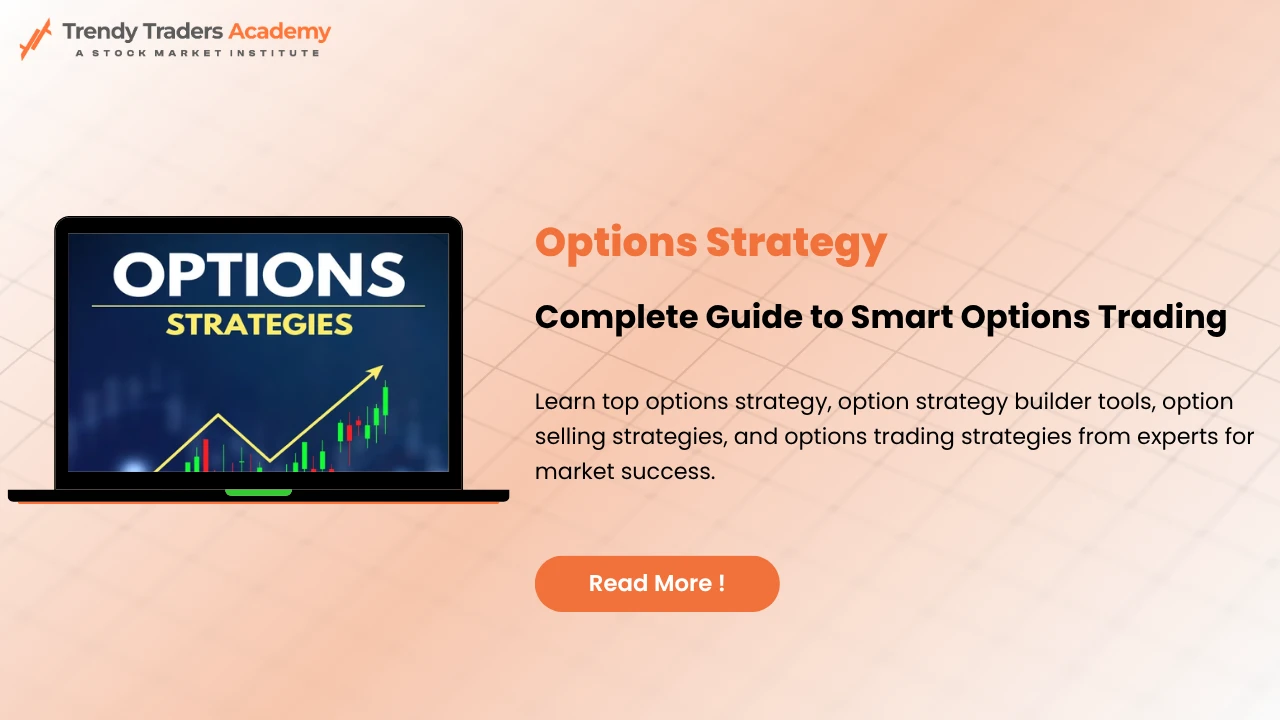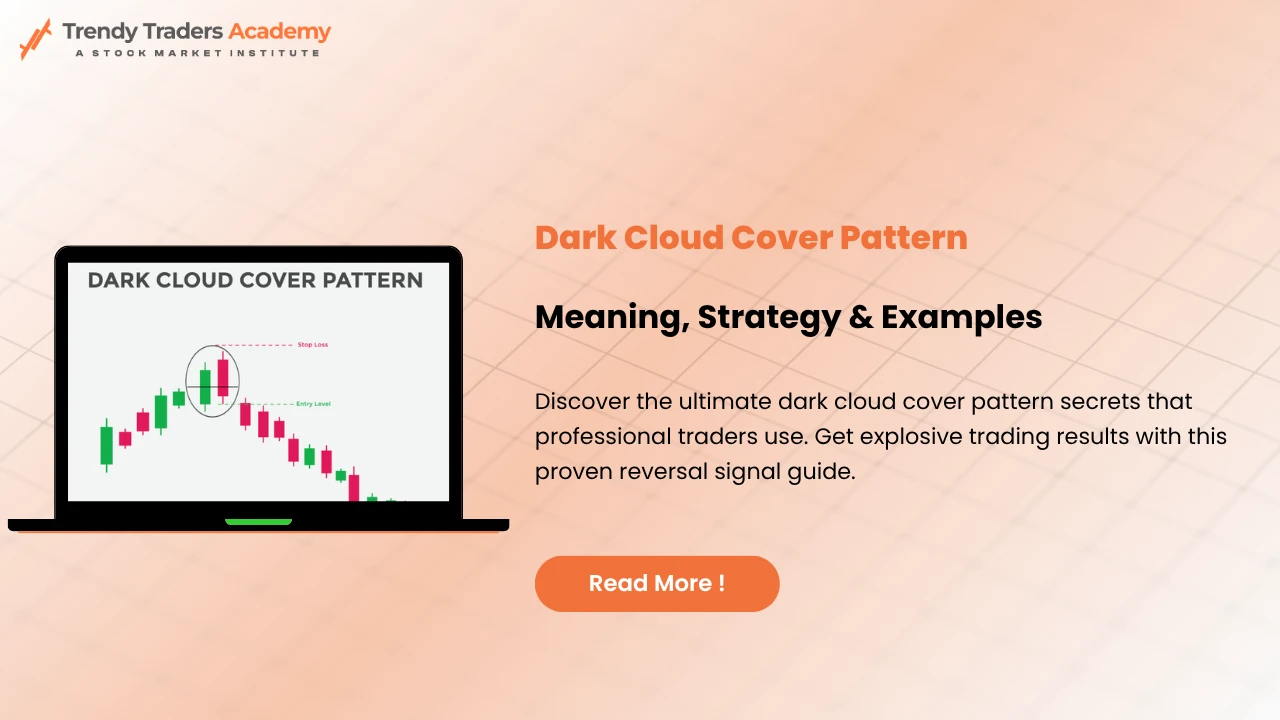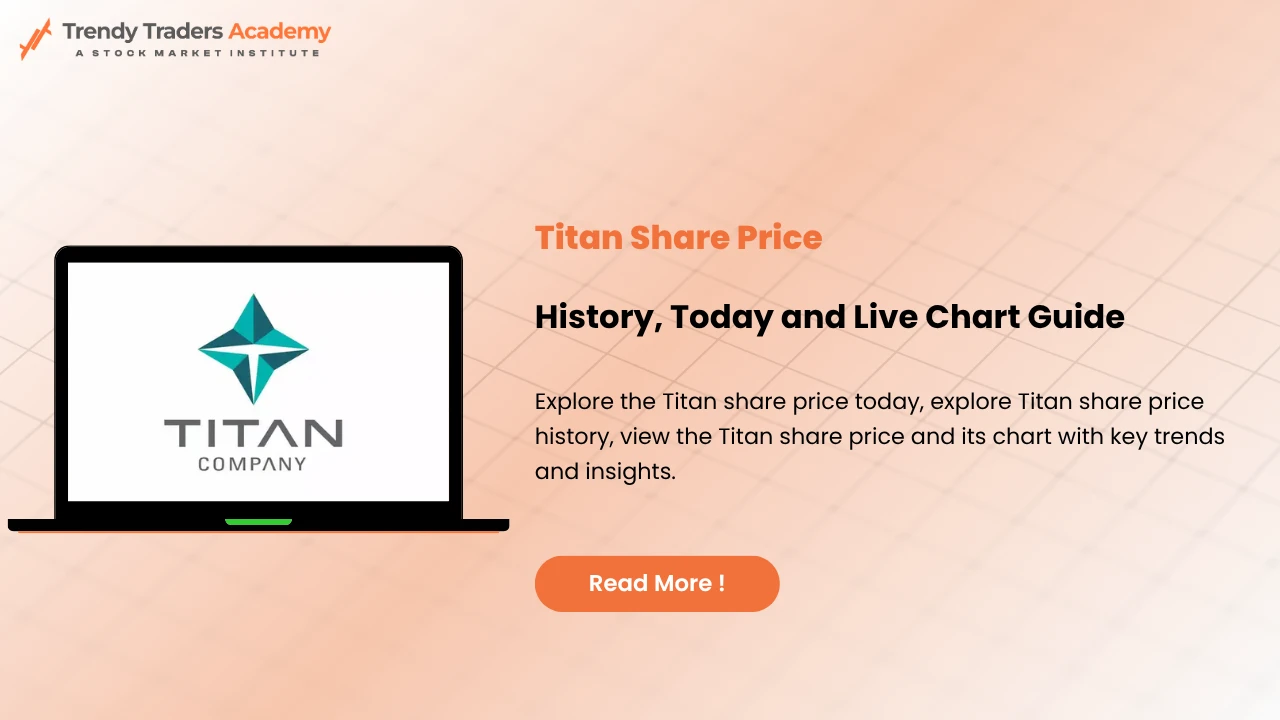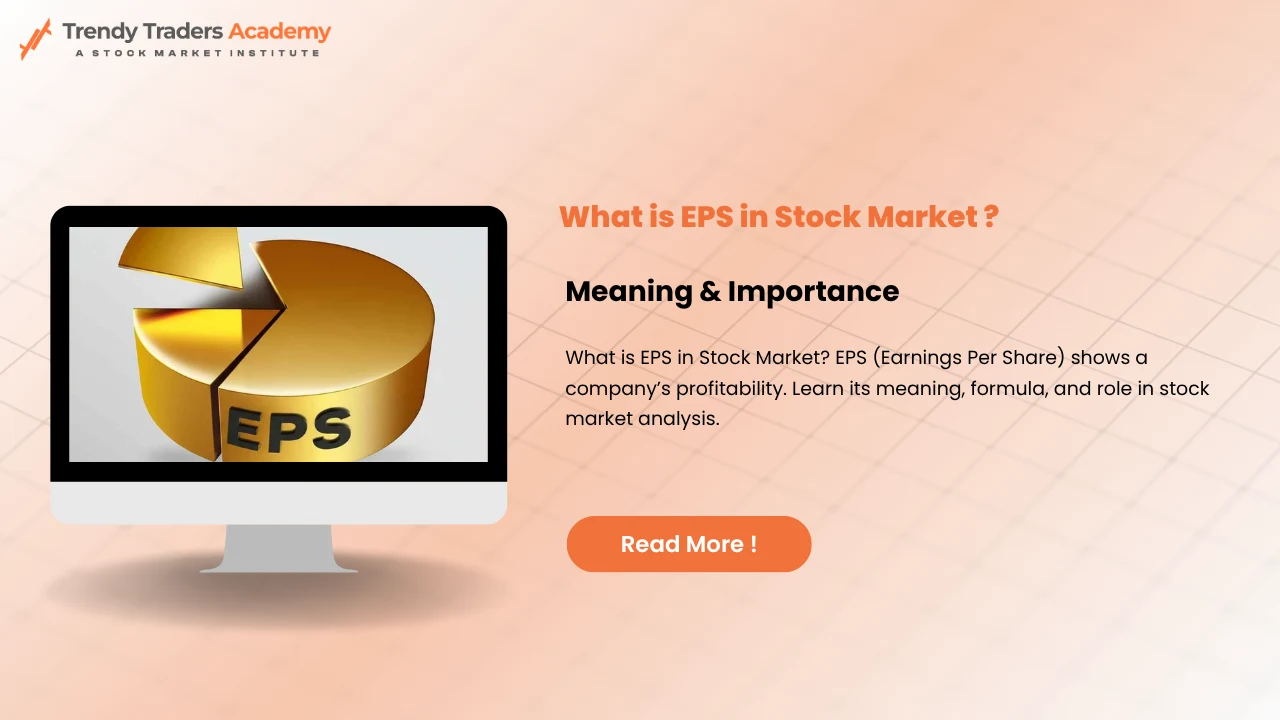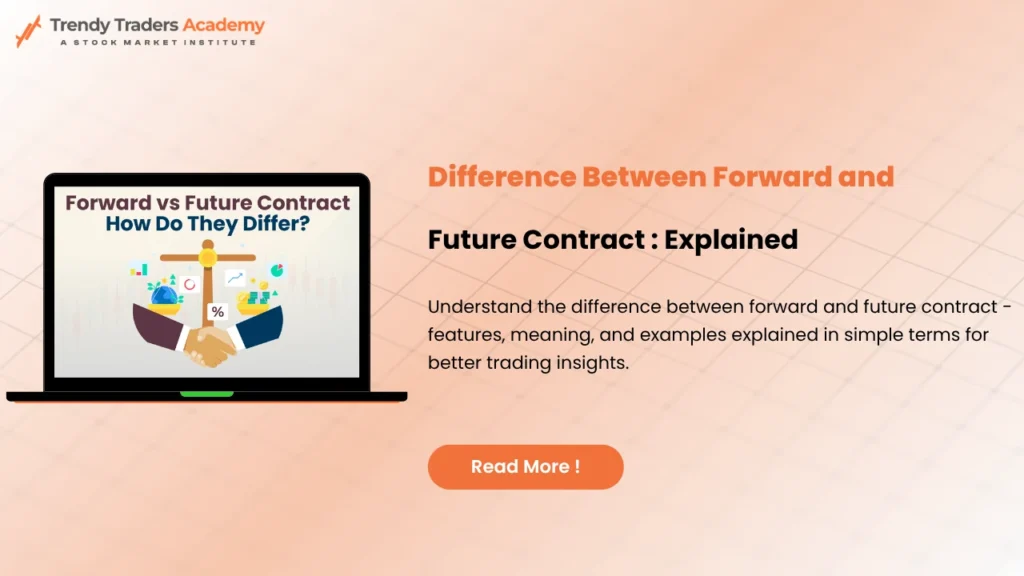
Difference Between Forward and Future Contract: Explained
You may find yourself confused when you find the difference between forward and future contract. Both are the arrangement of future sale/purchase of something, but they operate in entirely opposite manners.
Imagine it is as follows – a forward contract is your own suit, freshly tailored and specially designed to suit you, whereas a future contract is the one in the store – standardized, regulated, and that can be bought by anyone.
What Is a Forward Contract?
A forward contract refers to a tailor made contract between two parties to either purchase or to sell an asset at a specified price at a later date.
In contrast to contracts that are traded in the stock exchange, forward contracts are transacted privately, usually between businesses, banks or big investors.
These are prevalent in commodities (such as gold, oil or wheat), currency exchanges and interest rate transactions – in any place where there is one side that wishes to fix a future price to avoid market volatility.
Example: To-day a farmer contracts with a food manufacturer to sell 100 tons of wheat to the manufacturer after three months at a price of 25,000 here and now. They both have to abide by this agreement even when the market price increases or decreases.
In brief: Forward contracts save both the parties against the unpredictable market changes by setting prices today that are done tomorrow.
What Is a Future Contract?
A Future contract is a standard contract that is exchanged in an exchange (such as NSE, BSE or MCX) to purchase or sell an asset at a particular price on a future date.
Futures are controlled, clear, and readily exchangeable – this has made them favourable to traders and investors.
Each futures contract has preset terms such as:
- Quantity of the asset
- Expiry date
- Price per unit
- Margin requirements
Example: An investor buys a gold future contract on MCX for ₹60,000 per 10 grams, expiring next month. If gold prices increase, they can sell the contract for profit before expiry.
In short: Future contracts are exchange-traded, standardized versions of forward contracts designed to reduce risk and improve liquidity.
Purpose of These Contracts
The forward and future contracts are both created with the same objective, which is to hedge and have speculation.
- Hedging: They are applied by businesses to fix prices and minimize the uncertainty. Examples: A company that deals with flights purchases fuel futures to hedge the rise in prices.
- Speculation: They are used by traders to get a profit by anticipated price changes. Example: When a trader purchases oil futures, he/she anticipates the oil price to go up in the coming month.
Key Difference Between Forward and Future Contract
Basis | Forward Contract | Future Contract |
Market Type | Over-the-counter (Private) | Exchange-traded |
Standardization | Customized | Standardized |
Settlement | On maturity | Daily (mark-to-market) |
Counterparty Risk | High | Low |
Liquidity | Low | High |
Regulation | Unregulated | Regulated by SEBI |
Price Transparency | Limited | Public and visible |
Example | Farmer & buyer deal | Gold futures on MCX |
In simple terms – forwards offer flexibility but carry more risk, while futures offer safety but less customization.
Forward and Future Contracts Features
Forward and Future Contracts are contracts to purchase or sell a given asset at a particular price at a later date. Futures are standardized and traded in exchanges while Forwards are personalized and private.
Features of Forward Contract
- Customization: Every forward contract could be tailored to the needs of the buyer and seller – in terms of price, quantity, quality and delivery location.
- OTC Nature: These are contracts that are not listed in stock exchanges. These occur between two parties.
- No Daily Settlement: Unlike futures, the contract is settled only at the end of the agreed period.
- Higher Counterparty Risk: Since no exchange backs the deal, there’s always a risk one party might default.
- Lack of Liquidity: You cannot sell or transfer forward contracts easily.
- Used for Hedging: Mostly preferred by companies that want to lock prices for future business transactions.
Features of Future Contract
- Standardization: The exchange determines all the terms of the contract, including quantity, expiry and quality.
- Exchange-Traded: these are contracts listed and traded on regulated markets, such as NSE, BSE or MCX.
- Mark-to-Market Settlement: The profits and losses are determined on a daily basis. When your side is winning, money is deposited to your account and the opposite.
- Margin Requirement: to minimize default risk, to obtain performance traders are required to deposit a margin (a small percentage of the contract value).
- High Liquidity: Futures is freely sold or purchased during the market hours, which means that traders can get out of positions without any difficulties.
- Transparency: Prices are displayed in the open markets making the trade fair to everyone.
How Forward and Future Contracts Work
Let’s look at how these contracts operate in real markets:
Agreement Stage:
- Forward: The buyer and seller decide on price, quantity, and date privately.
- Future: The contract terms are already set by the exchange; you just pick how much to buy or sell.
Execution:
- Forward: There’s no intermediary; both parties directly transact.
- Future: The exchange acts as an intermediary to ensure both sides fulfill their commitments.
Settlement:
- Forward: Settled on maturity with physical or cash delivery.
- Future: Settled daily via mark-to-market adjustments.
Risk Handling:
- Forward: Default risk is on both parties.
- Future: Exchange clearinghouse absorbs the default risk.
Example of Forward and Future Contract
Forward Contract Example:
A coffee exporter signs a deal with a U.S. importer to sell 1,000 bags of coffee three months from now at $100 each. If prices rise to $120, the importer gains. If prices fall to $80, the exporter benefits.
Future Contract Example:
An investor buys a crude oil future on MCX at ₹7,000 per barrel. If the market price increases to ₹7,200, they can sell the contract for profit even before the expiry date.
Both examples show how these contracts help manage price uncertainty but in different ways.
Advantages of Forward Contracts
- High Flexibility: You can design every term as per your business needs.
- Perfect for Hedging: Helps protect against price fluctuations.
- No Margin Requirement: No need to deposit funds daily.
- Confidentiality: Since it’s private, terms remain undisclosed.
Advantages of Future Contracts
- Regulated and Secure: Controlled and safe backed by exchanges that reduce the threat of fraud or default.
- Liquidity: Can be sold or purchased without having to wait till the contract reaches maturity.
- Daily Settlement: Profits/losses have a regular adjustment and this ensures that your account remains balanced.
- Openness: The movement of the price is publicly visible which enhances confidence.
- Speculative Opportunities: Suited to the traders, who want to make money on the instant price fluctuations.
Risks and Limitations
Forward Contract Risks
- Default Risk: One party may fail to fulfill their side of the deal.
- Illiquidity: Difficult to find a counterparty to transfer the deal.
- No Regulatory Oversight: Legal issues may arise during disputes.
Future Contract Risks
- Market Volatility: Prices can change rapidly, causing margin calls.
- Leverage Risk: Even small market movements can lead to large losses.
- Complex Mechanism: Requires understanding of margin and mark-to-market systems.
Forward vs Future Contract Comparison
Aspect | Forward Contract | Future Contract |
Type of Deal | Private | Public |
Market | OTC | Exchange |
Risk Level | High | Low |
Customization | Full | None |
Settlement | End Date | Daily |
Regulation | None | SEBI / Exchange |
Example Asset | Currency, Commodities | Stocks, Index, Commodities |
Liquidity | Limited | High |
Real-Life Applications
User Type | Preferred Contract | Purpose |
Farmers | Forward | Lock crop prices early |
Exporters | Forward | Hedge currency risk |
Investors | Future | Profit from market trends |
Corporates | Both | Manage commodity cost fluctuations |
Banks | Forward | Hedge foreign exchange exposures |
Example Scenario: If a company imports crude oil and expects prices to rise, it can buy futures today to secure a lower cost. On the other hand, an exporter who will receive foreign currency later can use forward contracts to lock exchange rates and avoid loss from currency depreciation.
Conclusion
Whenever investing in a financial contract, financial risk management or trading, one must understand the difference between forward and future contract. Forward contracts are more secretive, customizable and risky. Future contracts are standardized, exchange-traded and less risky.
They are both useful risk management tools and price movement predictors. Consider forwards to be a one-on-one promise and futures to be a public contract that is supported by an exchange. They can be applied to make businesses stabilize profits and investors utilize business opportunities in the market when applied wisely.
FAQ'S
How do you compare a forward contract with a future contract?
A forward contract is a personal and individualized one whereas a future contract is a standardized one and is exchanged in an exchange.
Which contract is more risky?
Forward contracts are more risky, as they do not have regulation and counterparty guarantees.
Can individuals trade forward contracts?
Generally, forward contracts are used by corporations, exporters, or financial institutions – not retail investors.
Do both contracts require margin money?
No. Futures require margin deposits, but forwards don’t.
Can a forward contract be canceled?
Only by mutual agreement since it’s a private deal.
Is forward contracting legal in India?
Yes, they are mostly applied in corporations and banks within some regulatory frameworks.





